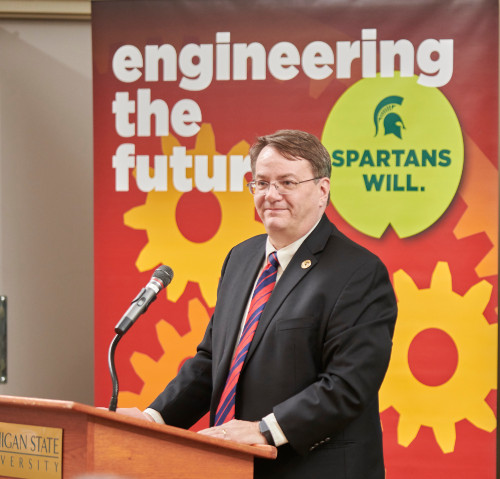Leo Kempel is the ninth dean of the College of Engineering, a founding college of Michigan State University and one of its largest academic units. He predicts a bright future for the state of Michigan and sees planning for a new Engineering and Digital Innovation Center at MSU as an essential step in providing cutting-edge education and research spaces that will expand talent and innovation needed by industries across the state.
Why is planning for the new Engineering and Digital Innovation Center at MSU significant to Michigan?
It’s about economic development. Attracting companies to our great state and maintaining a strong economy are goals we share with the state of Michigan. To achieve these goals, we must address demands along the continuum of evolving and new industries in Michigan, including capacity for manufacturing and materials research and expanding Michigan’s workforce to meet the needs of industry. The Engineering and Digital Innovation Center is part of our overall plan for giving Michigan a competitive edge.
What kind of research will take place in the facility?
Building plans include research facilities dedicated to exploring advanced materials, advanced material production methods, advanced material manufacturing techniques and digital innovations that are key economic factors for companies located in and heading to Michigan.
For instance, semiconductor chips are critical to a wide swath of industries such as automotive and commercial systems that produce things like refrigerators and washing machines. We want these semiconductor companies to come to Michigan where they are supported by ongoing research and a talented workforce.
Mobility is another key area of opportunity for our state and for MSU. This includes all aspects of mobility, from software to advanced energy storage to increasing the rate of electrification of the transportation system to the ability to charge vehicles and distribute power in such a way that enables mobility expansion without putting undo strain on the power grid. Again, research and talent are essential if we want our state to lead in these areas.
How will expanding student enrollment help to attract companies to Michigan?
Upwards of one-third of students in our incoming class next year want to be computer scientists. That’s 700 students looking to fill the IT talent pipeline for companies in all industries across our state. This generates growing demand for learning techniques and concepts related to digital methods as opposed to traditional analog methods. As a result, there is high demand for courses related to computer science and digital innovation.
Our goal is to prepare more students for the jobs of the 21st century, and for that we need appropriate space and teaching talent that supports world-class learning in relevant areas. Building plans include highly adaptable spaces designed with new ways of teaching and learning at the forefront.
One thing we see in this center is the opportunity for partnership among colleges at MSU, not just faculty-to-faculty partnerships. The center will also enable greater collaboration with industry partners as we together innovate new technologies that we cannot yet imagine. We see new ways of facilitating degree programs and other activities across campus, and new ways that we can collaborate with other academic institutions in the state even beyond what we’re doing now, which has been extensive over time.
